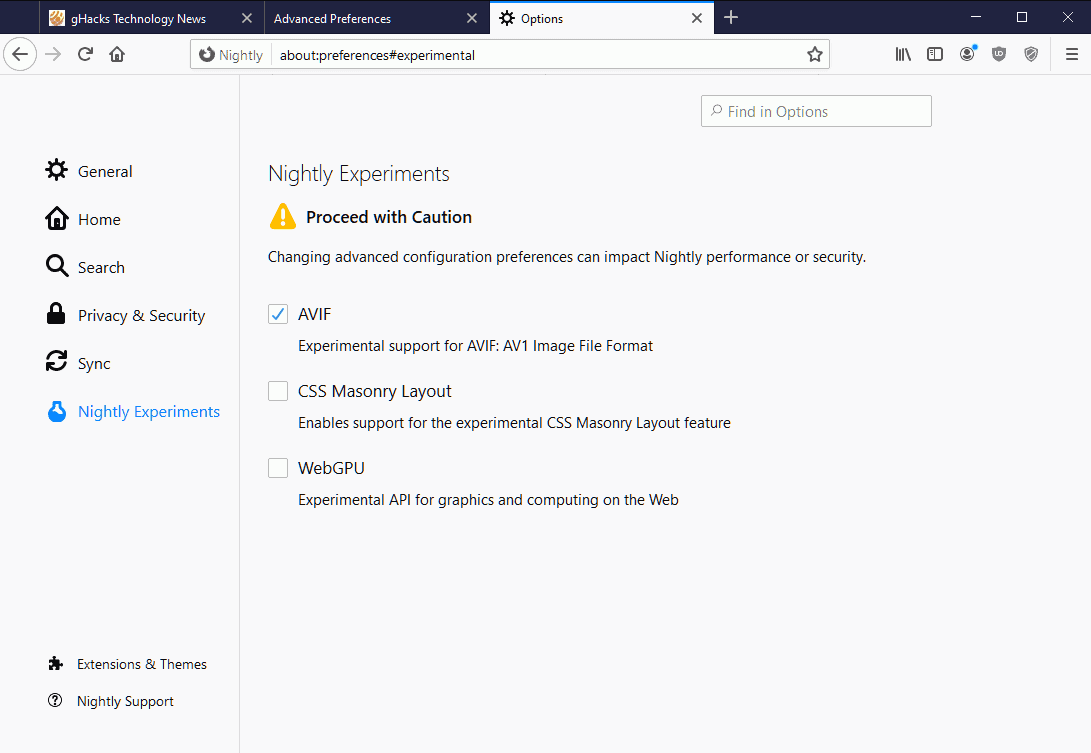Firefox Nightly got a new secret Experiments Settings page

The latest version of Firefox Nightly got a new secret Experiments Settings page that users of the browser may activate to control some features that Mozilla is working on currently.
Firefox Nightly is the cutting edge development version of the Firefox web browser; it gets features first but it considered the least stable version of Firefox because of all the development that is happening under the hood. Other Firefox channels, Beta and Developer, and even more Stable and ESR, are more stable.
Mozilla may add features to Firefox Nightly that are disabled by default or only temporarily enabled. Sometimes, it is possible to enable these features on the advanced preferences page about:config to test them right away.
The new experimental page of the Firefox web browser brings some of these features to the browser's options page.
The page is disabled by default and you need to change a preference first to enable it. Here is how that is done:
- Make sure you run at least Firefox Nightly 79 (check Menu > Help > About Nightly).
- Open the about:config page in the Firefox address bar.
- Search for the preference browser.preferences.experimental.
- Set the preference to True to enable the experimental page in Firefox's options. To disable it again, set the preference to False.
A restart is not required. All it takes then is to load about:preferences#experimental in the browser's address bar to access the Nightly Experiments page directly, or to select Menu > Options > Nightly Experiments instead.
Firefox Nightly lists three experiments on the page. A warning has been added to the page that changing these settings may "impact Nightly performance or security".
The following experiments are listed on the page currently:
- Support for AVIF -- Adds experimental support for the image file format AVIF: AV1 to Firefox.
- CSS Masonry Layout -- Adds experimental support for CSS Masonry Layout.
- WebGPU -- Enables the experimental API.
You may wonder about the purpose of the new page in Firefox's settings as you may switch the experimental features on or off on about:config as well. While that is the case, adding the option to the preferences may improve the discoverability of the new features provided that the settings page itself has been enabled.
Now You: Do you turn experimental features on occasionally?





















Ever since MOZ_FORCE_DISABLE_E10S=1, that effectively put an end to single process Firefox. Booo!
I’m seeing if Alex Kontos can bypass this issue on the new Waterfox Current. That way, at least I have a year.
@Greg that’s true but then most normal users wouldn’t know about it. This way it’s in plain view for all to see in preferences.
all Mozilla had to do is have a page/tab called for example ” about:experiments ” like about:config
enter
about:about
in the urlbar and a page of 36 FF abouts is displayed. May be in there someplace in Nightly.
it needs to be spooky and “hidden”, but also accessible to normies, probably contain some cringy messages too, and some completely unrelated mascot remebling an hippopotamus spinning some gears. look at this tab crash message
i.imgur.com/qlpN1Fu.jpg
“hehey, all your shit’s gone, but at the very least here’s my attempt at being witty. did it work? ok? no?? fine, uninstall me…”
There’s a difference between a Mason and a Freemason.
Mason someone that does brick or rock type work on the outside of buildings.
Freemason a secret society.
He or she asked “Masonry” not Freemason.
So they’re adding these additional options to the stable version, did I understand you correctly Mr. Brinkman?
I wouldn’t mind helping them out with testing the graphics option.
MASONRY – I only know what it means in the physical world “brick & mortar” I would assume maybe it would be the bedrock for building upon cascading style sheets maybe?
I’d really like the Linux Mint maintainers to offer up FF ESR as an an Install Option in their update manager what with that Fatty search bar nonsense losing any about:config control settings for FF Stable and to at least have a more secure Browser in FF ESR sans the FF Fat. I’ve not allowed the FF update/s past FF 76.0(Never offered FF 76.0.1) on my Linux Mint laptops. I’m currently being offered 77.0.1 but I’m not taking that Fatty search bar, not for me! But I’ll take the Fatty TUNA instead where Fatty has a better taste for me!
Maybe it depends on particular displays but that slimtofattybar, which really doesn’t improve focus or anything I can decipher at all, isn’t as annoying as I suspected. I never search from the urlbar, could be different when you do, IDK.
I made the changes to stabilize the bar, not hard, just one more thing to save. Now we’re moving out of about:config into other areas, more complication.
If remaining one of many to achieve some anonymity, given that FF is the default browser in many distros and Linux users are very obvious online, using Chromia will make you super obvious and return world class, seizure inducing obnoxiousness to the urlbar.
@ULBoom
With the Firefox + Linux combo you are not exactly hiding, either. Windows + Chrome is what the overwhelming majority of people uses.
You can ‘revert’ the megabar with userChrome.css – https://www.userchrome.org/megabar-styling-firefox-address-bar.html#mbarstyler (make sure you set Amount of URL bar enlargement to None)
@zdzichu
Or @SlimToFattyBar just switches to Ungoogled Chromium like anyone should, it’s the sanest browser on the market anyway.
At times, I am amazed how many people even bother to use experimental builds of software. If you are not a developer, why would you do that to yourself? It’s not like there is a financial reward or something, and all you do here is to provide even more telemetry than usual, while reducing the need to employ a real QA team.
I test (not use) pre-release versions of software which I like (AIMP, VLC, Paint.NET; in the past also Opera Presto and Firefox pre v52) so I can catch bugs and report them myself (not auto/telemetry nonsense) to the developer. This means I won’t have to deal with said bugs for a long period of time, or even revert to an earlier release build if it lands on a public version.
I don’t enjoy the new features early or whatever, I will usually give my feedback if it’s something I really like and feel it needs a change, otherwise I focus on things which I use and make sure they are not broken. I usually pick these within minutes, if there are any.
Sometimes it’s nice to get new stuff early. For example on the mac ff ran like a dog and they sorted that out (still not exactly blazing fast though), so users were glad to get that.
For the people wondering about masonry. Masonry is a popular layout that consists in arranging items (usually images) in columns. Unlike a grid, it doesn’t have rows, and unlike flexbox, items don’t flow along the columns. They are instead placed into the column with the least amount of contents at that point.
This layout was implemented as a JavaScript library, that web authors could add to their pages: https://masonry.desandro.com/
But recently, Mozilla came up with a proposal to standardize it in CSS: https://github.com/w3c/csswg-drafts/issues/4650
Firefox has an experimental implementation behind the layout.css.grid-template-masonry-value.enabled flag
Some info and demo in https://rachelandrew.co.uk/archives/2020/05/05/does-masonry-belong-in-the-css-grid-specification/
“Does anyone know what “Masonry†means?”
https://www.youtube.com/watch?v=vNoPJqm3DAY
I’ve already check on all of them
Masonry = https://en.wikipedia.org/wiki/Freemasonry
OMG
No they are not at all equal, they are totally different words. Wouldn’t it be lovely if people on the internet who don’t know what they are talking about just didn’t say anything and perhaps learn something instead?
Does anyone know what “Masonry” means?
Monty Python explained it well. Something about cheese…
Freemasonry.
A not-too-secretive organization who tries to conquer the world.
Freemasonry: it means it will brick your computer and other devices for free.
@Robert: it doesn’t work that way. It’s not free for all.
They don’t try to conquer, they aim to organize the world in terms of ethics, should their approach we opposed to other spiritualistic concerns and mainly those of the Roman catholic Church. For instance the French Masonry fought for the right to abort, in the seventies, in opposition to churches’ dogmas.
“Do you turn experimental features on occasionally?”
No, I want things to work without being a beta tester.
Then don’t use Nightly…? wtf
Then why do you use Nightly? Your answer doesn’t make any sense.
I was about to bring the exact same answer.
I’m not even sure I’d be willing to beta-test should Mozilla pay in return with a free 10 year subscription to their VPN service (that’d be a 50 bucks salary, not sure my time ain’t worth slightly more).